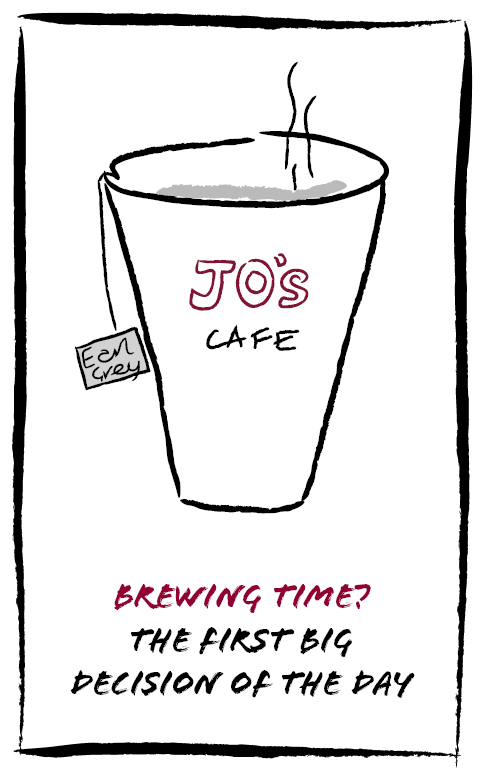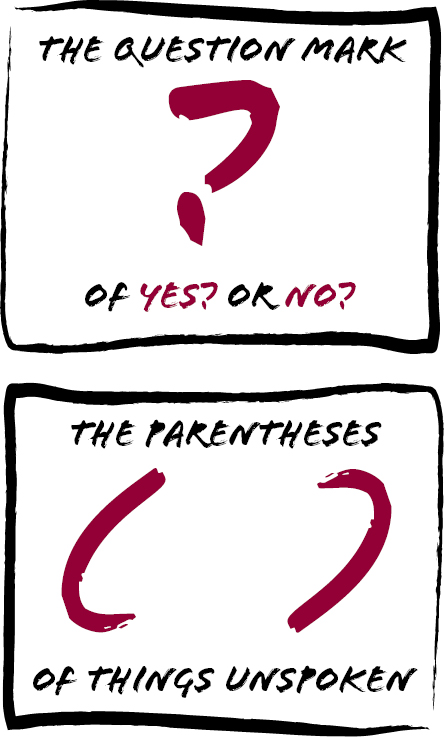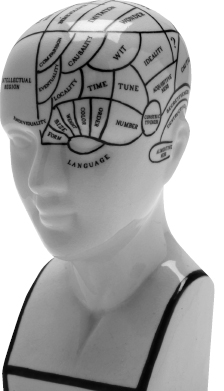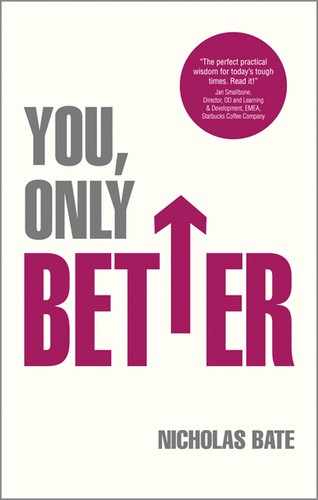Section 5
Manage Your Thinking. Make Great Decisions. Get It to Happen.
It's our most powerful asset: it can get us out of any problem or dilemma. It can change sad to happy and back to sad. It can fill time. It can get fed up with time. It's the route to decisions, from who to marry to what business to start up. It can cause a headache, it can drive a conversation for hours and it can suggest when enough is enough.
Thinking, our greatest hidden asset. Almost anything else which makes us smart is obvious: our eyes and ears and nose are there all the time. Our dexterity is at the end of our arm. But our thinking: it's hidden away, mysteriously. And how do we get it to work at its best? More sleep? Or more coffee? Or go sit on a beach and look at the sunrise?
Quite: man's greatest asset but surely one of the ones we ‘use’ least well on a day-to-day basis. Let's change that.
Why Is Thinking So Important?
It's perhaps worth considering this ‘daft’ question. With thinking you have options. When you don't think you are no more than a machine; once you have options you can take your life any place you please. As you'll see, many of the problems you perhaps think (there we go, you see) you have are merely problems of thinking: thus.
Jill is a very senior and a well-paid analyst at one of the larger oil companies. She's been in the job for 19 years and its attractions are fading, although the salary and security are of course well understood and appreciated. Recently she took up watercolours, mainly as a hobby, but has actually discovered she is very good at it and can sell a framed version of one of her paintings for around £300. Not bad, but not enough to retire on which she would love to do. Her thinking revolves around the powerful word ‘or’: should she stay with her current company or should she take the plunge and develop her painting skills but with the risk of not earning enough money? Her thinking was leading her astray: it doesn't need to be ‘or’, it could be ‘and’.
Confused?
But hang on: surely we cannot stop thinking! Surely we think all the time. I think it's going to rain, I think ‘I'll get the bus’. It's what we do … think.
You are right of course. It's partly a use of language as well. So without getting too complicated perhaps we can agree that we do of course think all the time, but this chapter is addressing that ‘purposeful’, ‘proactive’ thinking rather than just the day-to-day ‘whirrings’ of the human mind.
How Does ‘Thinking’ Work?
Let's introduce a simple model: reptile brain and higher/human brain. Reptile brain is the brain from early in our evolution of course, and it's brilliant: it saves us from crazy accidents every day with its fast ‘impulsive’ response. Of course that amazing ability can be frustrating: reptile brain is pattern seeking and likes to do things the way it always does things: same route to work each morning, listen to the same things on the radio, same views, same beliefs … Our goal is to appreciate reptile brain but to get human/higher brain to engage as often as is possible as it is an essential route to being the best version of ourselves. Our goal is to stop ourselves getting dulled and surviving on auto cue and coffee.

What Dulls Us? What Stops Our Best Thinking?
To be honest: a whole range of things:
And So How Do We Get Access to Our Best Thinking?
Our best thinking is a combination of:
Boosting Your Best Thinking
Other people.
Although other people can encourage and might share useful wisdom, and do sometimes have useful feedback, we must ultimately stay self-referenced rather than externally referenced. When we are self-referenced, it means we stick to our view, we stick to what is important to us. It does not mean we are selfish nor does it mean we ignore feedback, but it does mean we are not going to change our views simply so that we don't disturb someone else's view. Let's take a couple of examples:

Accelerating our experience.
Travel broadens the mind. True: it's one of the most dramatic examples. But it's also true that almost anything broadens the mind if the brain is receptive: discussion, a movie, watching storm clouds gather. But one thing does it quickly, any time, any place and on a budget, and that is reading. Always have a book on the go: it will dramatically broaden and deepen the nature of your thinking.
Fear.
Fear causes us to close down. Understandably: it's about taking no risk, self-preservation. We will see some good strategies for dealing with fear a few paragraphs on.
Perceptional perspective.
Any situation can be looked at in a number of ways. To boost your thinking, always look at a situation in the most resourceful way. For example:
Our Personal Operating System
The last two examples in the last paragraph (fear and perceptual perspectives) introduced us to a fascinating aspect of our thinking. We are all familiar with our phones and computers having operating systems on which the ‘apps’ run. It's clearly very important that the operating system is a good one and is also up to date. We too have an operating system: we have a set of beliefs, a mindset if you will, which governs how we think. As you can see, the analogy of software is a good one. And often for many of us the operating system is not a particularly useful one, nor has it been upgraded for a while. This will fundamentally stop us being the best version of ourselves as … ready …?
Belief (or mindset) drives behaviour drives results.
Thus if you believe that you are not good enough to contribute to the team meeting, then there is a real likelihood that you will not. And if you don't then you won't get any experience of contributing so you will continue to reinforce that limiting belief: ‘I'm weak at contributing to meetings’. There are broadly two kinds of beliefs: those which help or are empowering, such as ‘yes, I can increase my creativity’. Or limiting, such as ‘I am not a creative person’. Clearly empowering beliefs support the concept of You, Only Better. Limiting beliefs will hold us back.
Limiting belief examples
Labels, e.g. ‘I'm too old’. There are one or two things we are perhaps not so good at when we are older. But to say (at age 30) ‘I'm too old to learn a new language’ is simply not true. Or (at age 60) ‘I'm too old to get fit’ is not true either.
Generalisations, e.g. ‘I never get an opportunity’. Well perhaps you have missed out on some opportunities. But have you NEVER had an opportunity in your life? Quite!
Empowering belief examples
No failure, only learning.
I can do anything. But I can't do everything.
Improving Our Thinking
So thinking is our greatest asset: understood. And our thinking can be improved by basics such as TLC and managing our personal operating system. And then it dawns on us that our thinking is like any skill: it needs practice and there are tactics we can choose to develop that practice power. Thus:
Proactive thinking
Which considers the question, what do I need to anticipate? Regular asking of this question will help us stay at the top of our game. Thus:
In our business, which is currently very successful, what do I need to anticipate to ensure that
- our competitors cannot begin to close in on us
- we do not get too busy to innovate
- we avoid complacency
- we do not get too big so that some people who don't like working in the larger organisation any more will be poached by a competitor?
In our personal life, what do I need to anticipate …
- that the kids are coming up to secondary school and we really dislike the current options … for schooling
- that I would like to slow down but I still need to be earning money?
Critical thinking
Ask the question, what do I/we need to do better?
Thus, in our business which is a small electrical store, what do we do to ensure we are not hit by the on-line businesses?
Thus, in our family life, how can we get more time together?

Lateral thinking
This is the basis of creativity and is, in essence, the question: what do I need to do differently?
Thus, how can I get more contact with senior people in the organisations with which I deal? Because one thing is certain, the methods I am using now are failing.
Decisions
There are a few potential strategies to making a better decision assuming you have done the background thinking.
One is to weigh up the pros and cons, i.e. create a simple T-bar with the pros and cons on either side. Are there more pros than cons to buying a new car rather than a second hand car? To changing job rather than working your way up with your current firm? A pros and cons approach is certainly worth doing, less perhaps because it helps you form the final decision, more that it clarifies your thinking and reveals where you need to get more data or simply to think some more. It also needs to be borne in mind that, especially when we are making decisions on our own, we often know the conclusion we want and simply stack the columns to give the appearance of a more logical approach!

Another is to mull it over. It's amazing how 24 hours can put things in perspective. Only yesterday we were never ever going to consider speaking to him again. But now, maybe the real learning is for us, having reflected on how controlling we have become. Formally called ‘incubation’, it's powerful.
Yet another is to get someone else's opinion. Everybody's brain is unique, so bring another brain into play and you get another perspective. A good decision considers all of the perspectives.
Or of course to combine all three: which perhaps gives us the best overall strategy for making a decision:
Action
Do you remember this one? A decision is not a decision until we take an action.
- I will go to the gym
- We will increase our market share by 42%
- I'm going to write a best seller.
All easily said. They are decisions. But they are not yet actions. What is an action? An action is breaking the decision down into components which can be achieved, owned, date stamped and measured. And eventually ticked off.
Thus ‘write novel’ is simply too much. But how about:
- Decide core plot 1 hour, Monday evening 7 pm to 8 pm
- Outline character of main character, Wednesday 6.30 pm to 7.30 pm
- Write first 1,000 words of opening murder scenes, Saturday morning 8–10.
Suddenly the decision can become reality. But what do you say if you don't feel like doing the action? That's why we did so much work on personal energy back in Chapter 2. As we said at the time much time management, much decision making is not so much about a methodology approach, it's actually about the energy to make it happen.
Jean-Paul
Jean-Paul felt he was cracking up. He couldn't assemble a decent story any more and he knew time was running out. The Listings magazine – Le Zip List – on which he worked was putting him under pressure and if he didn't come up with something soon he'd be back where he started, ‘in the lists’. Lists of best bars, worst bars, best movies, best romantic moves, best thrillers. Lists of best English phrases, best prices on Eurostar. Lists of the perfect cocktail to seduce your new girlfriends. Yep, you get the drift: Jean-Paul didn't want to be back ‘in lists’. But he needed to be able to think again. Once upon a time just choosing a café and small black coffee would get the creative juices flowing. But now all he could do was stare at his iPad. Or even worse start surfing for inspiration or start responding to e-mail.
But maybe there was hope: he liked this idea that thinking was a skill. After all he could get good at a skill. As a kid he'd become brilliant at skateboarding just by relentless daily practice. And as a student working in Le Semi-Colon wine bar he learnt about, and more importantly became able to, produce cocktails. So he was proactive but it was also about lack of distraction. With both skateboarding and cocktails that had been the main thing in his life. Now. Jeez. Now. His mother, his girlfriend, his rent, his noisy neighbours, his boss, the payment on his motorbike, his smoking habit which he didn't seem to be able to crack. His novel – La Bicyclette qui n'a pas de nom – which was going nowhere, the leaking window into his bedroom, the cost of eating out in Paris. And his mother. Or had he mentioned that already?
OK: so here was the plan. Thinking was a skill. He needed to be able to think better for his job, in fact everything depended on that SO he was going to dedicate himself to de-cluttering and single-minded focus just as when he was a kid and a bartender. He would start producing some good stories and, in so doing, re-secure his position of being the number 1 journalist on Le Zip List. Then he needed to stop kidding himself and sort out all the things in his crazy life.
Sorted.
He started.
Two weeks later he produced his best two stories ever.
Three weeks later the leaking window was fixed, eating out was only for two nights a week, smoking was reducing day by day. His mother had agreed to find her own place and the relationship with his girlfriend was better than ever. La Bicyclette qui n'a pas de nom? Ahhh … that was a bigger challenge.


A Few Questions If I May?
1. Sometimes I just find it hard to really think; I just seem overloaded: any suggestions?
I think you have answered your own question: of course the brain can think quickly and under pressure but of necessity the result is likely to be a compromise. It is far, far better to allow the brain some reflection time. If you are regularly finding yourself having to make decisions under pressure it would be good to review Chapter 4 on productivity practices again.
2. I notice some people seem to be able to think really quickly and come up with some great ideas. How do they do that?
They may have a bit of a genetic advantage but it's mainly down to practice. Start throwing yourself into the meetings, stop censoring your own ideas and you will find both processes cause an increase in speed of thinking, speed of contribution and the value of what you are bringing to the meeting will increase.
3. I find some decisions are impossible: whichever way you go you can't be sure. Is there any way to have confidence about one route or the other?
Only by ‘due diligence’, i.e. by ensuring you have done everything you can to make it a quality decision. But plenty of decisions are very hard – about your career, your business, your family – and they all have consequences way down the line. Put the time in up front and early on and you should feel confident you did the best you could. And finally be assured that only a few decisions are truly final. Many, many – especially if they were good quality in the first place – can be adjusted later.
